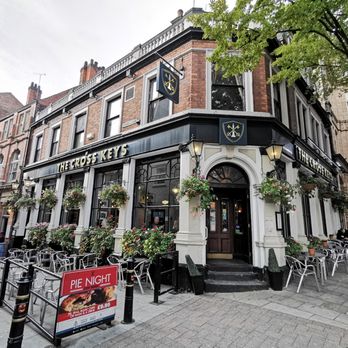Nottingham Pubs Struggle to Survive Amid Rising Costs and Declining Footfall due to…..read more
Nottingham Pubs Struggle to Survive Amid Rising Costs and Declining Footfall
In recent months, Nottingham’s vibrant pub scene has faced unprecedented challenges, with many beloved local establishments on the brink of closure. The combination of soaring operational costs, changes in consumer habits, and a marked decline in footfall has left pub owners scrambling to stay afloat. While the issue is not unique to Nottingham, the city’s pubs are bearing the brunt of the crisis, highlighting the growing pressures on an industry once considered the heart of British social life.

Rising Operational Costs
One of the most significant threats to Nottingham’s pubs is the rising cost of doing business. Utility bills, particularly energy prices, have surged dramatically in recent months, putting strain on already tight margins. Pubs, which traditionally rely on high levels of foot traffic and social gatherings, have seen their energy consumption skyrocket with little relief in sight.
Moreover, inflation has caused the cost of food and drink to increase, making it difficult for pubs to keep prices competitive while maintaining quality. Beer prices alone have climbed significantly, with some establishments facing the uncomfortable decision to either raise prices or reduce their offerings. This has led to a further decline in customers, many of whom are now more reluctant to spend on nights out due to tightening household budgets.
Declining Footfall
In addition to the soaring costs, Nottingham pubs are grappling with a noticeable drop in footfall. According to industry reports, fewer people are visiting pubs, with many opting for other forms of entertainment or staying home due to the rising cost of living. The shift in consumer behavior, partly accelerated by the pandemic, has led to a long-term decline in the number of pub-goers, with many opting for cheaper alternatives or socializing in private settings.
This change in habits has been exacerbated by the growing popularity of online streaming services and at-home entertainment. As more people stay home to watch sports, movies, or TV shows, the traditional “pub experience” seems less appealing, especially when it involves paying higher prices for food and drink.
Impact on Local Communities
The impact of these challenges is not just economic—it’s deeply social. Pubs have long been an integral part of local communities in Nottingham, serving as hubs for socializing, celebrating milestones, and fostering relationships. For many, the local pub is a place where friendships are formed, local culture is celebrated, and the community comes together. The closure of pubs, particularly those in less central areas, risks eroding this social fabric.
The closure of iconic pubs like The Ned Ludd and The Bell has already left noticeable gaps in the city’s social landscape. With fewer spaces for people to meet, engage in meaningful conversations, or simply unwind, many worry that the city’s charm and sense of community will begin to fade. In a world that has become increasingly isolating, the loss of these spaces feels like a blow to local culture.
Government Support and the Path Forward
In response to these mounting challenges, some local authorities and trade organizations have called for greater government support for the pub industry. This includes providing more targeted financial aid, tax relief, and energy cost subsidies to help keep pubs open. Additionally, there are calls for greater investment in promoting pubs as community assets, ensuring that they continue to serve as spaces for social engagement and cultural celebration.
However, the road ahead for Nottingham’s pubs remains uncertain. While some establishments are managing to adapt—by diversifying their offerings, increasing their presence on social media, or embracing new trends like craft cocktails or live music—many are still struggling to keep their doors open.
Conclusion
Nottingham’s pubs, once thriving cultural hubs, are now facing a battle for survival amid rising operational costs and declining footfall. With many local businesses teetering on the edge of closure, the future of the city’s beloved pub scene remains in jeopardy. Whether or not these establishments can weather the storm will depend on the continued support of both local authorities and loyal customers, as well as the ability of the pubs themselves to innovate and adapt to a changing landscape.
As the situation develops, one thing is clear: the struggle of Nottingham’s pubs is not just a story of financial hardship, but also a reminder of the crucial role these spaces play in building and maintaining community connections. If the city’s pubs are to survive, it will require a collective effort to preserve what has been a central part of Nottingham’s social life for generations.











Post Comment